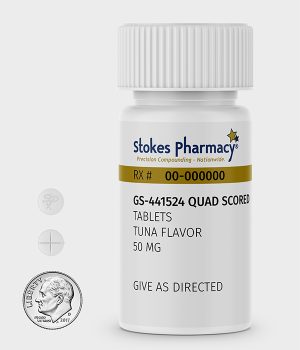Over the last few years great progress has been made in the treatment of feline infectious peritonitis (FIP). This previously deadly disease in cats can now be successfully managed with proper treatment.
The following information was written by Dr. Stephanie Sorrell, Prof. Séverine Tasker, Dr. Sam Taylor, Dr. Emi Barker, and Prof. Danielle Gunn-Moore
FIP is a severe disease in cats caused by feline coronavirus. COVID-19 is also caused by a coronavirus but the coronavirus causing FIP is not the same and only infects cats. Feline coronavirus is commonly found in the feces of cats and research has shown that infection is very common among cats. Thankfully, in most, it causes mild diarrhea or no signs at all. However, in a small number of cats, the virus changes (mutates) inside the cat, and interacts with the cat’s immune system in a certain way, resulting in FIP. Finding coronavirus In a cat doesn’t mean they have FIP, and it is not possible to consistently tell the difference between a coronavirus causing FIP, and one causing no signs of illness. Further tests must be performed by a veterinarian to diagnose FIP.
We do not know why certain cats develop FIP and others do not, but it is diagnosed more often in:
Cats with FIP can show a variety of signs as the disease can affect any organ in the body. The most common signs are:
Additionally, the disease can cause fluid to accumulate in the abdomen/belly, chest and occasionally around the heart (so called ‘wet’ FIP) so owners may notice a swollen, rounded belly or the cat may have difficulty breathing. The non-effusive (‘dry’) form can affect any organ including the intestines, lymph nodes, brain, kidneys and eyes. Many cats have a combination of ‘wet’ and ‘dry’ forms of FIP and some cats have pale, slightly yellow gums.
If the brain or spinal cord is affected (neurological FIP) cats will show signs such as fits, an abnormal way of walking (wobbly gait), changes in behavior or trembling for example.
If the eyes are affected (ocular FIP) they may look cloudy, bloody or with different pupil sizes, and the cat may show signs of pain such as holding the eye or eyes closed.

When fluid develops in a body cavity - especially the abdomen and/or chest

When no fluid forms

Affecting the brain and/or spinal cord

Affecting the eyes
In the past, there was no effective treatment for FIP but thankfully times have changed and there are antiviral medications available with good results in treating FIP. These drugs are legally available in many countries and have been shown to be safe and effective (through clinical studies), although they can be expensive.
Current recommendations are to treat for 12 weeks to allow full clearance of the disease. This can seem a long time but gives cats the best chance of recovery. It may be that shorter courses can be recommended in the future but for now 12 weeks of treatment is required. Different types of FIP require different amounts (dosages) of antiviral medication, FIP cats showing neurological and/or ocular signs being treated with higher dosages. However, there is variation in how cats respond, and adjustments may be needed during the treatment period. If a cat is not responding as expected, the amount of antiviral medication may need to be increased.

Stokes Pharmacy has formed an exclusive partnership with the Bova group to offer a U.S.-made oral treatment for FIP. This treatment is supported by Bova’s unique drug formula, which has been utilized in clinical research studies.

With a partner like Stokes, you can be confident in the medications you receive and use. Our commitment to quality is put into practice in all that we do, for every patient we serve.
In an industry where regulations vary by state, and every prescription is custom-formulated, there’s a lot of room for error. Not at Stokes Pharmacy. We’ve always set the bar higher, voluntarily meeting and often exceeding the strictest compounding standards in the nation.
Our website uses cookies to enhance your browsing experience. By clicking “Accept” you are agreeing to our use of cookies. Learn more in our Privacy Policy.
If you select “Decline” we will respect your privacy, though your browsing experience may be limited.